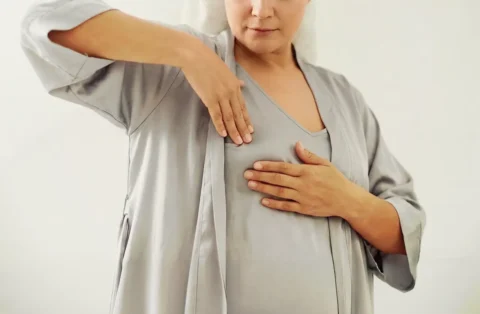What you’ll learn
We’ll break down what to expect with hormone replacement therapy (HRT), how long it typically takes to notice changes, and what factors can affect your results. You’ll also learn how QuickMD’s menopause hormone therapy (MHT) services make it easier to get expert care and feel more like yourself again.
Menopause is a natural part of life. But that doesn’t mean the symptoms are easy to deal with. For many women, the hot flashes, mood swings, and sleep disruptions can start to affect daily life. Hormone replacement therapy (HRT) can help ease these symptoms by giving your body the hormonal support it needs, replacing key hormones that your body cuts back on producing once menopause hits.
If you’re considering hormone replacement therapy (HRT) as a way to ease some of the frustrating symptoms of menopause, you probably have a lot of questions. The biggest question on your mind might be “how soon does HRT start working?”. Every person’s timeline is different. However, with guidance from a licensed provider, you can find a treatment plan that’s right for you and start feeling like yourself again.
In this article, we’ll walk you through the most common menopause symptoms, what to expect from HRT, and how long it typically takes to notice a change.
What to expect when starting hormone replacement therapy (HRT)
As you enter perimenopause, your hormone levels fluctuate, particularly estrogen and progesterone. These ups and downs can leave you feeling physically off-balance, emotionally drained, and unsure of what’s happening to your body. While menopause isn’t a disease that needs curing, the symptoms can sometimes feel overwhelming. While this “change of life” can feel jarring, you’re not alone. Fortunately, support is available.
Hormone replacement therapy (HRT) helps restore your body’s natural balance by replacing the hormones that are decreasing. This can relieve many symptoms, including hot flashes, mood swings, and vaginal dryness. Here at QuickMD, our menopause hormone therapy (MHT) program is designed to provide personalized support for each stage of this journey.
Some women start to feel better within just a few weeks, while others notice gradual improvements over a few months. Every woman’s body is different, but getting the right support from a licensed provider can help you find the relief you deserve.
HRT timeline: Symptom improvements
How long does it take for HRT to work? While timelines vary from person to person, you can typically start to see results within the first few weeks to a month, with decreased brain fog, better sleep, and fewer hot flashes and night sweats. Over the course of the next several months, you may see a boost in your mood, energy levels, and libido. Improvements in muscle tone and achieving a more stable body weight can take between 3 to 6 months.
Please keep in mind that these are general guidelines. Every woman will have a different experience. Your timeline may look different based on your body, lifestyle, and the type of therapy you’re using.
How do you know HRT is working?
You’ll begin to notice HRT is working when your symptoms start to ease up. Here’s a closer look at what that might look like:
- Hot flashes: Estrogen helps regulate your body’s internal thermostat. During menopause, the drop in estrogen confuses your hypothalamus (the part of your brain that controls body temperature), making it think you’re overheating. HRT helps restore balance and reduces those sudden temperature spikes.
- Night sweats: These are closely tied to hot flashes, and they can severely disrupt sleep. By balancing hormone levels, HRT helps reduce the frequency and intensity of night sweats so you can get better rest.
- Mood swings: Estrogen and progesterone affect brain chemicals like serotonin and dopamine, which impact your mood. When hormone levels drop, you may feel more anxious, irritable, or depressed. HRT helps create more emotional stability.
- Fatigue: It’s not just the night sweats causing exhaustion. Hormone dips can cause your energy levels to take a dive, too. As your sleep improves and hormone levels even out, you might notice you have a lot more energy.
- Vaginal dryness: Lower estrogen levels can thin the vaginal lining and reduce natural lubrication, leading to itching, discomfort, or pain during intimacy. HRT helps reverse these effects, restoring moisture and tissue health.
Keeping track of your symptoms and progress can help you notice changes you might not catch from day to day. You may want to jot down your daily progress and symptoms in a journal or mobile app. Taking stock of this data can be a helpful springboard for conversations with your provider to ensure your treatment program is working well for you.
Factors that affect HRT timing
There’s no one-size-fits-all timeline for how soon you’ll feel better after starting HRT or MHT. Here are a few things that may affect how quickly it works:
- Type of hormones used: You may receive estrogen alone, progesterone alone, or a combination. The type of therapy affects both how and when you feel the results.
- Dosage: Hormone dosage is prescribed based on your symptoms. Typically, a provider will prescribe the lowest effective dose required to help manage systems. Higher doses are not appropriate for everyone, nor do they necessarily mean you’ll see faster results. Your provider will tailor your dosage to meet your health needs safely.
- Overall health and lifestyle: Certain medical conditions, medications, or even nutritional deficiencies can influence how your body absorbs and uses hormones.
- Age and menopause timing: Women who start HRT closer to the onset of menopause (typically around age 51) may respond more quickly.
- How the hormones are delivered: HRT comes in several forms, including pills, patches, creams, gels, or injections. For example, injections and patches tend to deliver hormones more directly and can work faster, while oral tablets may take a bit longer to show effects.
While we’ve covered what can impact how soon HRT works, it can also be helpful to understand more about the role of these hormones themselves. Let’s break down two of the most common hormones used in HRT:
- Progesterone: Typically taken in cycles or specific time frames, it may take a few weeks to start working. It’s often used to balance out estrogen to protect the uterus and help with sleep or mood issues.
Learn more about progesterone for MHT. - Estrogen (especially estradiol): Since estrogen can be taken through a patch every 3 days or orally if taken daily, its effects can kick in sooner, commonly within two weeks. Estradiol is one of the most potent forms and is commonly used in MHT.
Learn more about estrogen for MHT.
If you’re not noticing changes after a month or two, don’t panic. Your provider may adjust your dosage or the way you receive treatment to help you get the results you want.
Hormone replacement therapy guidance with QuickMD
HRT is one of the most effective ways of managing the menopausal symptoms that could be affecting your quality of life and overall well-being. At QuickMD, we specialize in menopause hormone replacement therapy (MHT), a form of HRT designed specifically for women going through menopause. Our licensed providers work closely with you to understand your symptoms, test your hormone levels, and build a treatment plan tailored to your needs.
MHT isn’t a magic switch. It’s a journey. It takes time to rebalance your hormones and feel like yourself again. However, in just a few weeks, many women start to feel more clear-headed, emotionally steady, and physically comfortable.
Our goal at QuickMD is to partner with you in the normal hormonal transitions of perimenopause and menopause and give you the best quality of life.
Frequently asked questions about HRT
How long does HRT take to work?
Timelines can vary, but some women start to see results within the first few weeks, then ongoing improvements over the next several months.
What if I don’t notice changes?
That’s totally normal in the early stages. Talk to your provider. They might adjust your dosage or switch the delivery method to better suit your needs.
Can timing vary between individuals?
Yes. Your age, health, hormone levels, and lifestyle can all influence how long it takes to see changes.
What does HRT do to a woman?
HRT helps rebalance estrogen and progesterone, which can ease menopause symptoms like hot flashes, mood swings, and vaginal dryness.
Is there a natural alternative to HRT?
There are herbal supplements (including lemon balm and black cohosh), as well as dietary changes that may help with mild symptoms or menopause and perimenopause.
Does HRT make you gain weight?
Not directly. Some women actually find their metabolism stabilizes and weight gain slows once their hormones are balanced. Lifestyle choices and age also play a role.




